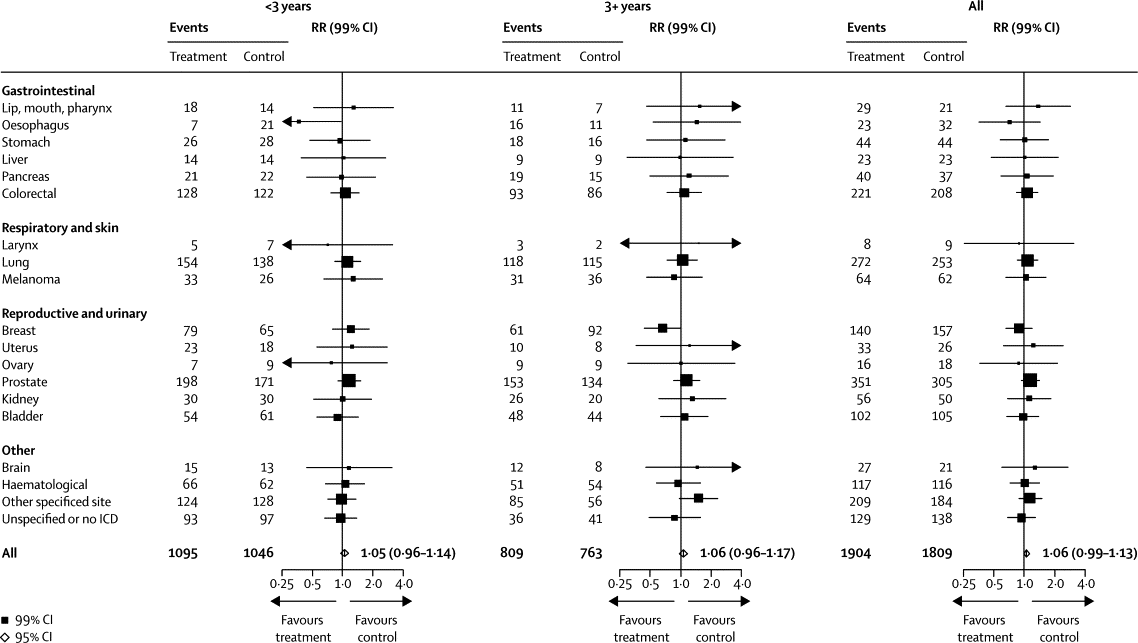Lancet:补充叶酸不能防癌
| 导读 |
一项纳入13项大规模随机对照试验的Meta分析显示,服用叶酸补充剂既不会增加也不会降低治疗期间的癌症发病率。该Meta分析已发表在《柳叶刀》1月25日在线版上(Lancet 2013 [doi: 10.1016/S0140-6736(12)62001-7])。
从20世纪90年代晚期开始,多个国家开始强制在面粉... |

一项纳入13项大规模随机对照试验的Meta分析显示,服用叶酸补充剂既不会增加也不会降低治疗期间的癌症发病率。该Meta分析已发表在《柳叶刀》1月25日在线版上(Lancet 2013 [doi: 10.1016/S0140-6736(12)62001-7])。
从20世纪90年代晚期开始,多个国家开始强制在面粉中添加叶酸以预防神经管缺损,一些人还认为服用叶酸补充剂有助于预防癌症。但其他一些国家并未允许对食品进行叶酸强化,也不建议服用叶酸补充剂,部分原因在于担心叶酸可能促进癌症发生和进展。
纳入本项Meta分析的研究均符合下列条件:随机对照试验,评估叶酸补充剂的效能,招募至少500名受试者,结局中包含癌症发病率,对受试者进行至少1年的补充剂/安慰剂干预。最后共纳入13项研究,49,621名受试者。挪威公共卫生研究所的Stein Emil Vollset博士表示,用叶酸补充剂预防癌症的希望和对其诱发癌症的担忧都被这项Meta分析结果打消了。
2/3的受试者为男性,基线时平均年龄为64岁。在12项研究中,受试者每日服用叶酸剂量为0.5~5 mg不等,另一项研究则评估了40 mg/d大剂量叶酸的效果。治疗时间为1.8~7.4年不等(平均5.2年)。
服用补充剂可使血浆叶酸浓度升高3倍,并使血浆同型半胱氨酸水平降低25%。在检验大剂量叶酸的那项试验中,服用补充剂使得血浆叶酸浓度升高了100倍,但对血浆同型半胱氨酸水平未产生明显的进一步影响。
叶酸补充剂对总体癌症发病率的影响并不显著。在服用补充剂的受试者中,所有类型癌症的总发病率为7.7%,而服用安慰剂者为7.3%,差异不明显。
延长治疗时间或提高补充剂剂量,并不影响总体癌症发病率。后者也不随年龄、性别、基线叶酸水平、基线同型半胱氨酸水平,或者是否住在使用叶酸强化面粉的国家而改变。
尽管在使用大剂量补充剂的那项试验中血浆叶酸水平增加百倍,但补充剂组(65例癌症)与安慰剂组(72例癌症)之间在总体癌症发病率方面仍无显著差异。
叶酸补充剂对特定部位癌症的发病率也没有明显影响,包括结直肠癌、肺癌、乳腺癌和前列腺癌。
原文链接:
Effects of folic acid supplementation on overall and site-specific cancer incidence during the randomised trials: meta-analyses of data on 50 000 individuals
Background
Some countries fortify flour with folic acid to prevent neural tube defects but others do not, partly because of concerns about possible cancer risks. We aimed to assess any effects on site-specific cancer rates in the randomised trials of folic acid supplementation, at doses higher than those from fortification.
Methods
In these meta-analyses, we sought all trials completed before 2011 that compared folic acid versus placebo, had scheduled treatment duration at least 1 year, included at least 500 participants, and recorded data on cancer incidence. We obtained individual participant datasets that included 49 621 participants in all 13 such trials (ten trials of folic acid for prevention of cardiovascular disease [n=46 969] and three trials in patients with colorectal adenoma [n=2652]). All these trials were evenly randomised. The main outcome was incident cancer (ignoring non-melanoma skin cancer) during the scheduled treatment period (among participants who were still free of cancer). We compared those allocated folic acid with those allocated placebo, and used log-rank analyses to calculate the cancer incidence rate ratio (RR).
Findings
During a weighted average scheduled treatment duration of 5·2 years, allocation to folic acid quadrupled plasma concentrations of folic acid (57·3 nmol/L for the folic acid groups vs 13·5 nmol/L for the placebo groups), but had no significant effect on overall cancer incidence (1904 cancers in the folic acid groups vs 1809 cancers in the placebo groups, RR 1·06, 95% CI 0·99—1·13, p=0·10). There was no trend towards greater effect with longer treatment. There was no significant heterogeneity between the results of the 13 individual trials (p=0·23), or between the two overall results in the cadiovascular prevention trials and the adenoma trials (p=0·13). Moreover, there was no significant effect of folic acid supplementation on the incidence of cancer of the large intestine, prostate, lung, breast, or any other specific site.
Interpretation
Folic acid supplementation does not substantially increase or decrease incidence of site-specific cancer during the first 5 years of treatment. Fortification of flour and other cereal products involves doses of folic acid that are, on average, an order of magnitude smaller than the doses used in these trials.
Funding
British Heart Foundation, Medical Research Council, Cancer Research UK, Food Standards Agency
来源:医学论坛报
 腾讯登录
腾讯登录
还没有人评论,赶快抢个沙发